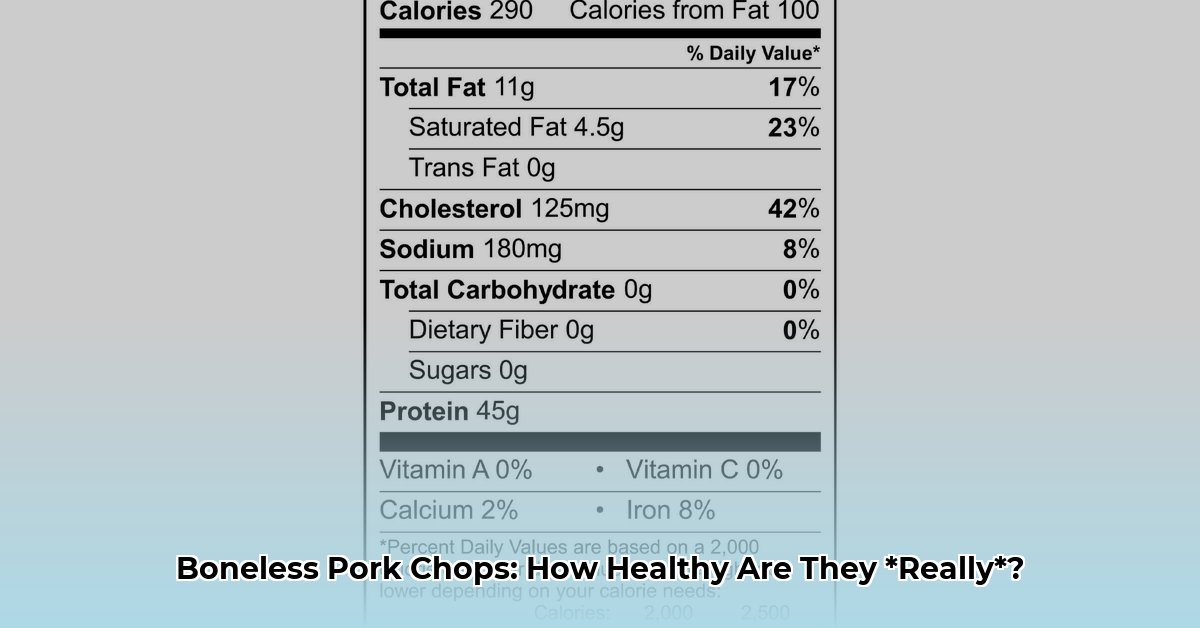Decoding the Nutritional Value of Pork Chops
Boneless pork chops are a popular and versatile protein source. Understanding their nutritional profile can help you make informed choices about incorporating them into a balanced diet. This guide provides a comprehensive overview of the nutritional value of boneless pork chops, including macronutrients, micronutrients, different cuts, cooking methods, and tips for incorporating them into a healthy eating plan.
Macronutrients: Fueling Your Body
Macronutrients—protein, fat, and carbohydrates—are the nutrients our bodies need in larger quantities for energy and essential functions. A typical 4-ounce (113g) serving of cooked boneless pork chop (usually from the top loin) provides a substantial amount of protein, typically between 22 and 26 grams. This represents approximately 44-52% of the recommended daily intake for an average adult. Protein is crucial for building and repairing tissues, supporting muscle growth, and maintaining a healthy immune system.
A 4-ounce serving contains roughly 4-11 grams of fat, with about 1.5 to 4 grams being saturated fat. This contributes approximately 6-17% of the daily recommended fat intake and 8-20% of the recommended saturated fat intake, based on a 2,000 calorie diet. While some fat is necessary for hormone production and nutrient absorption, it’s generally recommended to limit saturated fat intake. Some research suggests a link between high saturated fat intake and increased risk of heart disease.
A 4-ounce boneless pork chop contains approximately 140 to 220 calories. Pork chops are not a significant source of carbohydrates. They also contain cholesterol, typically around 70-80mg per serving, which is about 23-27% of the recommended daily intake. Dietary cholesterol’s impact on blood cholesterol levels is a complex topic with ongoing research. While some studies suggest a minimal impact, it’s still a factor to be mindful of, especially for individuals with certain health conditions.
Here’s a summary of the macronutrient profile of a 4-ounce serving of boneless pork chops:
| Nutrient | Amount per 4oz (approximate) | % Daily Value* |
|---|---|---|
| Calories | 140-220 | ~7-11% |
| Protein | 22-26g | ~44-52% |
| Total Fat | 4-11g | ~6-17% |
| Saturated Fat | 1.5-4g | ~8-20% |
| Cholesterol | 70-80mg | ~23-27% |
| Sodium | ~60mg (varies with preparation) | ~3% |
| Carbohydrates | ~0g | 0% |
*Percent Daily Values are based on a 2,000 calorie diet. Your individual needs may vary.
Micronutrients: Essential for Health
Beyond macronutrients, boneless pork chops offer essential micronutrients—vitamins and minerals crucial for various bodily functions. Pork is a good source of iron, providing approximately 0.7 to 1 milligram per serving—important for red blood cell production and oxygen transport. It also provides zinc, which supports immune function, and several B vitamins (thiamine, niacin, riboflavin, B6, and B12), essential for energy metabolism, nerve function, and red blood cell formation. Pork chops are a good source of potassium, an electrolyte vital for muscle function, fluid balance, and blood pressure regulation. A 4-ounce serving provides around 300-400 milligrams of potassium.
Choosing and Cooking Your Pork Chops
The nutritional content of pork chops can vary based on the cut and cooking method. Leaner cuts, such as the top loin chop, are lower in fat and calories compared to rib or shoulder chops, which have more marbling. Cooking methods also impact the final fat and calorie content. Grilling, baking, or pan-frying without added oil are generally healthier choices than deep-frying or breading. Trimming visible fat before cooking can further reduce fat content.
Integrating Pork Chops into a Balanced Diet
To maximize the nutritional benefits of pork chops:
- Portion Control: A 4-ounce serving is a good guideline.
- Balanced Meals: Pair pork chops with nutrient-rich sides like roasted vegetables, salads, or whole grains.
- Sodium Awareness: Be mindful of added sodium in marinades and seasonings. Opt for low-sodium options or use fresh herbs and spices.
- Variety: While pork chops offer valuable nutrients, a diverse diet with various protein sources and other nutrient-rich foods is essential for optimal health.
Pork Chops and Weight Management
Due to their high protein content, boneless pork chops can be a valuable asset for weight management. Protein promotes satiety, helping you feel fuller for longer and potentially reducing overall calorie intake. Leaner cuts and healthy cooking methods are key for maximizing the benefits while minimizing added fat and calories.
Ongoing Research and Individual Needs
Nutritional science is constantly evolving. While current understanding suggests that lean pork can be part of a healthy eating pattern, individual needs vary. Consulting a registered dietitian or healthcare professional can provide personalized guidance on incorporating pork chops into your diet, considering your health status, goals, and any specific dietary requirements. They can help determine appropriate serving sizes and address any concerns. Remember, a balanced approach to eating, incorporating a variety of nutrient-rich foods, is crucial for overall well-being.
- Rectangular Glass Food Storage Containers For Meal Prep - January 27, 2026
- Borosilicate Glass Food Containers Keep Meals Fresh and Organized - January 26, 2026
- Choosing Glass Containers With Snap Lids for Fresh Food Storage - January 25, 2026










